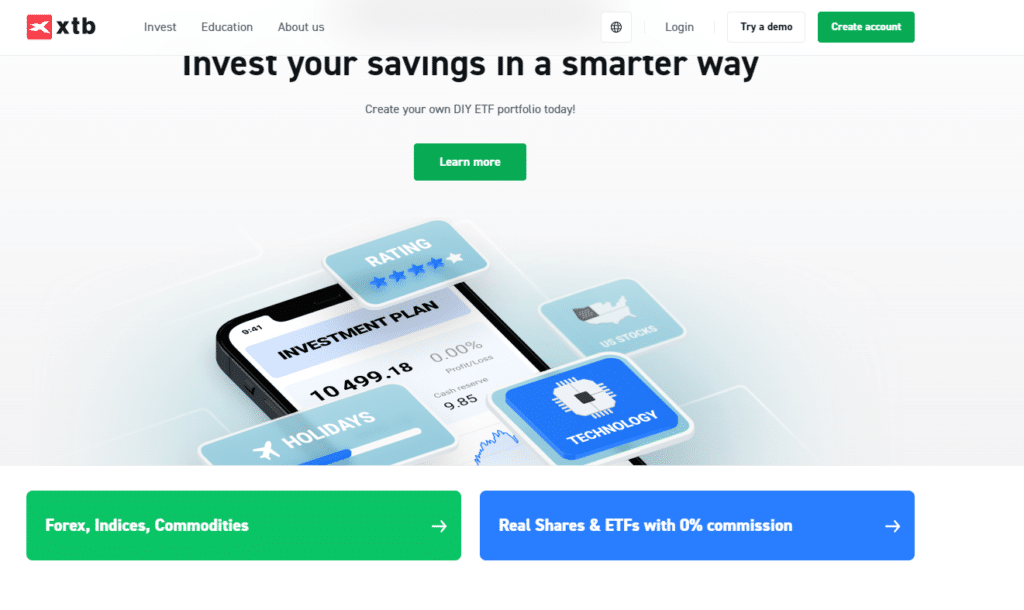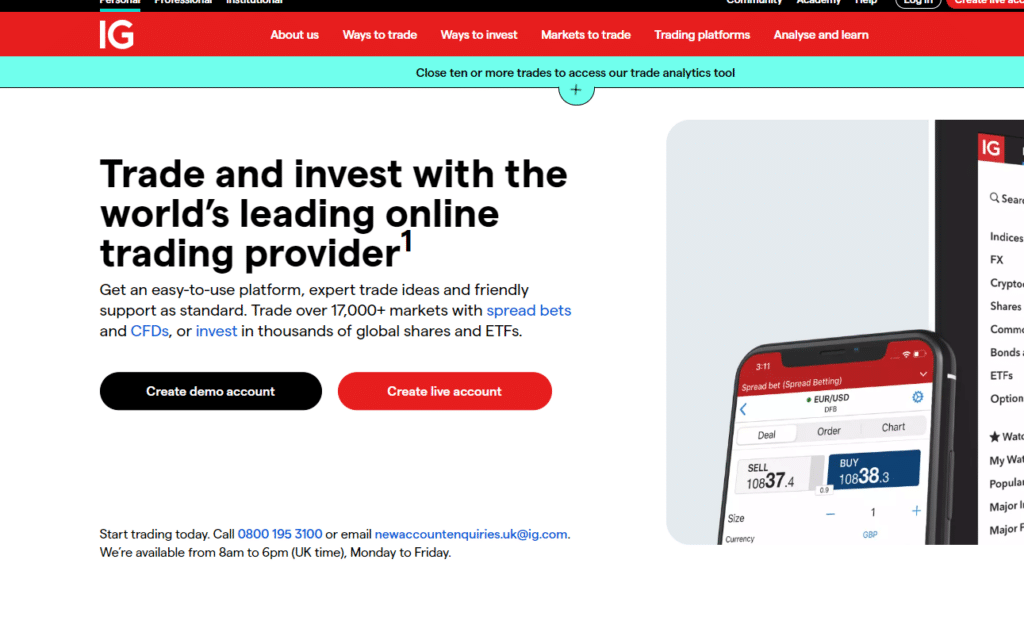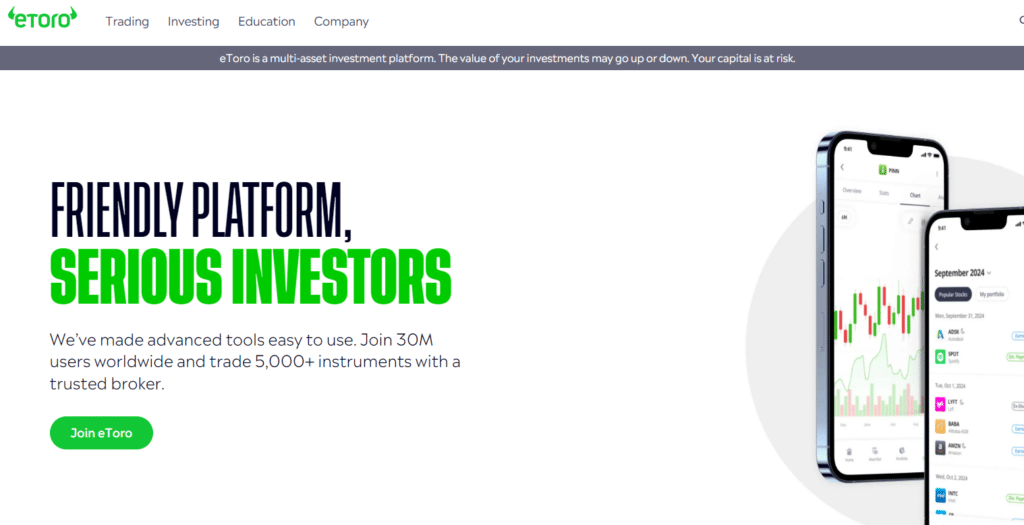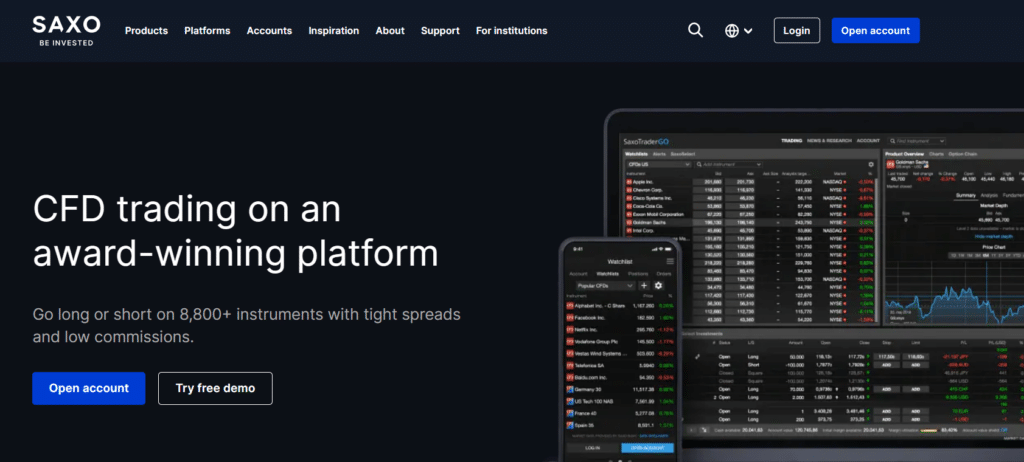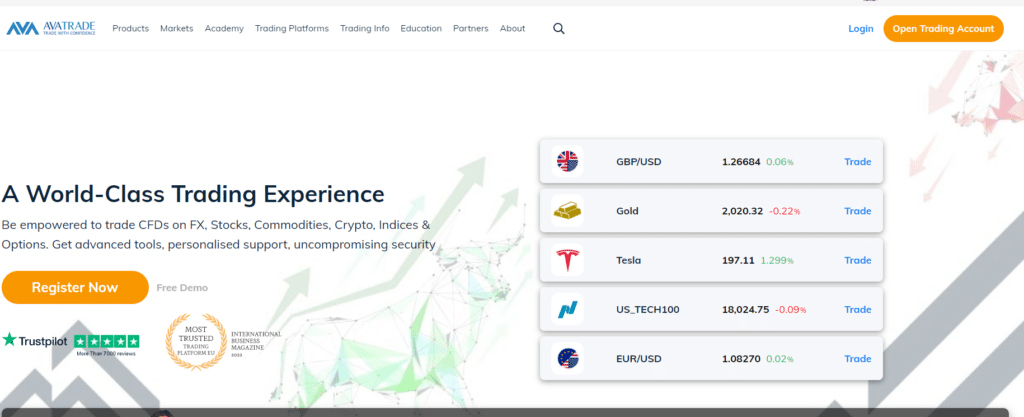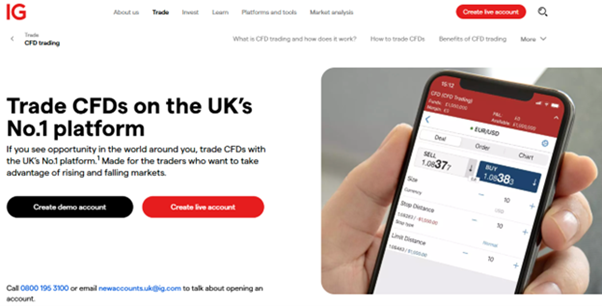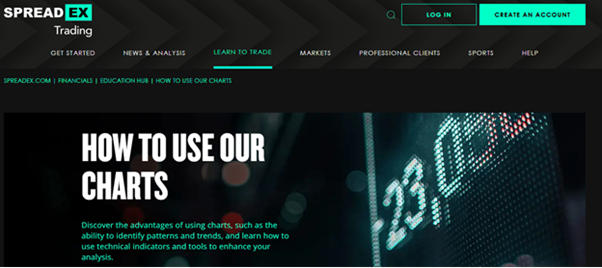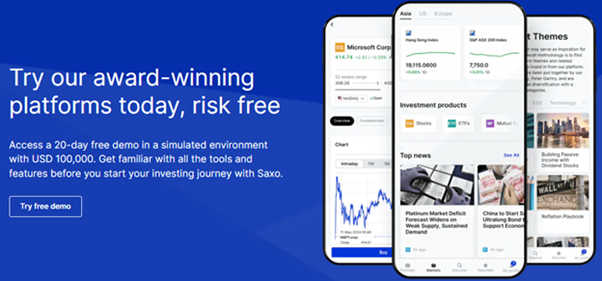Best CFD Brokers in the UK

Thomas Drury
Co-Founder
Seasoned finance professional with 10+ years' experience. Chartered status holder. Proficient in CFDs, ISAs, and crypto investing. Passionate about helping others achieve financial goals.
Twitter ProfileAuthor Bio

Dom Farnell
Co-Founder
Dom, a Co-Founder at TIC, is an avid investor and experienced blogger who specialises in financial markets and wealth management. He strives to help people make smart investment decisions through clear and engaging content.
Twitter ProfileAuthor Bio
Fact Checked
How we test
At The Investors Centre, we pride ourselves on our rigorous fact-checking process. To delve deeper into our meticulous testing procedures and discover how we ensure accuracy and reliability, visit our dedicated page on how we test.
Risk Warning
Please bear in mind that trading involves the risk of capital loss. 51% to 84% of retail investor accounts lose money when trading CFDs with the providers below. You should consider whether you can afford to take the high risk of losing your money.
Last Updated 10/04/2025
Explore our curated list of reputable, regulated CFD brokers, each rigorously tested with real funds. All brokers are accessible to traders in the United Kingdom.

SpreadEX
CFD Trading Score: 4.8/5
81% of retail CFD accounts lose money.
2
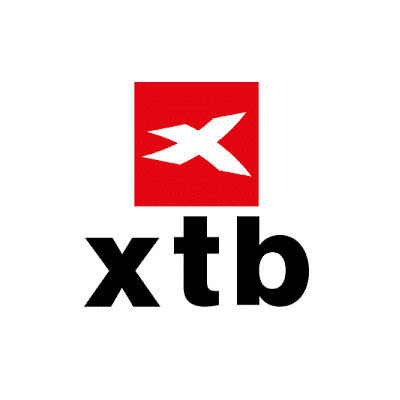
XTB
CFD Trading Score: 4.7/5
73% of Retail CFD Accounts Lose Money

IG
CFD Trading Score: 4.6/5
71% of Retail CFD Accounts Lose Money
4

eToro
CFD Trading Score: 4.5/5
51% of retail CFD accounts lose money.
5
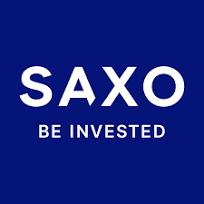
Saxo
CFD Trading Score: 4.5/5
64% of retail CFD accounts lose money.
6

AvaTrade
CFD Trading Score: 4.3/5
76% of retail CFD accounts lose money.
Quick Answer: What is the best Broker for CFD Trading in the UK?
Featured Brokers
IG
- Zero commissions* on stocks and ETFs.
- Award-winning xStation 5 trading platform.
- Access to 5,600+ global markets.
71% of retail investor accounts lose money when trading spread bets and CFDs with this provider.
81% of retail investor accounts lose money when trading CFDs with this provider. You should consider whether you can afford to take the high risk of losing your money.
What Are CFDs?
CFDs (Contracts for Difference) let you speculate on the price movement of an asset—whether it’s going up or down—without ever owning the actual thing. That means you can go long or short, and with leverage, even small price moves can have a big impact on your account.
In the UK, brokers must be regulated by the FCA, and that adds a layer of safety. But there’s still a wide range when it comes to fees, platform quality, available markets, and trading tools.
In this guide, I’ll break down what I’ve learned—comparing the top CFD brokers in the UK, sharing personal insights, and helping you find the one that actually suits your trading style.
CFD Broker Comparison Table
| Rank | Broker | Best For | FCA Regulated | Trading Platforms | Key Assets | Demo Account | Min. Deposit |
|---|---|---|---|---|---|---|---|
| #1 | SpreadEX | Best overall UK CFD broker & spread betting | Yes | Proprietary, TradingView | Forex, indices, stocks, commodities | ✅ | £100 (spread betting) |
| #2 | XTB | Lowest-cost trading for regular users | Yes | xStation 5 | Forex, stocks, indices, crypto | ✅ | £0 |
| #3 | IG | Advanced tools & market analysis | Yes | IG proprietary, MetaTrader | Forex, stocks, indices, options, ETFs | ✅ | £250 |
| #4 | eToro | Social & copy trading plus multi-asset access | Yes | eToro Web & Mobile | Stocks, crypto, ETFs, indices, forex | ✅ | $50 (~£40) |
| #5 | Saxo Markets | Advanced technical traders & deep market access | Yes | SaxoTraderGO, SaxoTraderPRO | Forex, stocks, bonds, ETFs, commodities | ✅ | £500 |
| #6 | AvaTrade | Beginner-friendly, low-cost, easy setup | Not FCA | AvaTrade WebTrader, MT4/MT5 | Forex, stocks, indices, crypto, ETFs | ✅ | £100 |
| #7 | Pepperstone | Ultra-low forex fees & MT4/MT5 support | Yes | MetaTrader 4/5, cTrader | Forex, indices, stocks, commodities | ✅ | £0 |
Here are the top 7 best CFD Brokers in the UK:
- SpreadEX – Best CFD Broker in the UK
- XTB – Cheapest CFD Broker for regular trades
- IG– Excellent for Advanced Trading tools and analysis
- eToro – Best for other trading facilities within the same account
- Saxo – Excellent Option for Advanced Technical Traders
- Avatrade– Best CFD Broker for beginners
- Pepperstone– Noteworthy low Forex Fees
7 Best CFD Brokers in the UK Ranked
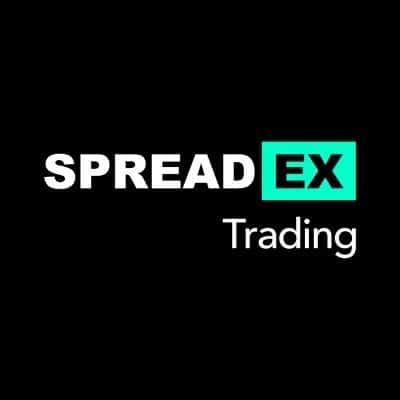
Pros & Cons
81% of retail investor accounts lose money when trading CFDs with this provider. You should consider whether you can afford to take the high risk of losing your money.
- Dual Trading Options: SpreadEX continues to offer both CFD trading and financial spread betting, which is a standout feature in 2025. This dual setup gives traders the flexibility to choose how they want to engage with the markets—whether for speculation, tax efficiency, or diversification.
- Competitive Spreads: The platform remains strong on tight spreads, especially in major markets like forex, indices, and UK-listed shares. This can really make a difference over time when it comes to trading costs.
- User-Friendly Interface: The web-based and mobile platforms are still clean, fast, and easy to navigate—ideal for beginners but also efficient for more active traders. SpreadEX continues to focus on simplicity without sacrificing functionality.
- TradingView Integration: While it still doesn’t support MetaTrader 4 or 5, SpreadEX now offers a deeper TradingView integration, giving traders access to advanced charting tools, technical indicators, and a customisable workspace.
- No ISA or Non-Leveraged Investment Accounts: SpreadEX is all about leveraged trading. It doesn’t offer ISA accounts, long-term investing options, or unleveraged portfolios. If you're looking to build a retirement portfolio, this isn’t the place.
- UK and Ireland Only: Access remains restricted to UK and Irish residents, so international traders are out of luck unless that changes in the future.
What Market Access Does This Broker Offer?
SpreadEX offers spread betting and CFD trading across a broad range of markets—including forex, equities, indices, commodities, and even niche assets like political events and entertainment outcomes. That last part is still fairly unique in the industry and appeals to traders who like to speculate beyond traditional markets.
What CFD Instruments Can I trade?
SpreadEX stands out from other brokers with its unique offering, providing spread betting on a diverse range of assets. This includes not only financial markets but also areas such as politics and entertainment, catering to a wide array of interests and trading preferences.
Who are they best for?
SpreadEX is best for UK and Irish traders who want the flexibility of both CFD trading and spread betting, especially those interested in diversified markets—including politics and entertainment—without sacrificing ease of use.
What do our experts say
SpreadEX is ideal for UK traders who want both CFD trading and spread betting, with great charting tools and competitive spreads on major markets.

Pros & Cons
73% of retail investor accounts lose money when trading CFDs with this provider. You should consider whether you can afford to take the high risk of losing your money.
- Extensive Market Access: XTB gives you access to a seriously broad range of markets. Whether you're trading forex, indices, stocks, commodities, or even cryptos, the platform has you covered. It’s one of the more diverse offerings out there for UK traders in 2025.
- Low Forex Spreads: If you're a forex trader, you'll appreciate XTB’s tight spreads. I’ve personally found them to be some of the most competitive in the market, which is a big deal if you're trading frequently or scalping.
- xStation 5: Fast and Feature-Rich: XTB’s proprietary platform, xStation 5, has come a long way. It’s fast, clean, and packed with solid tools—from advanced charting to built-in market sentiment data. I found it easy to customise, and order execution is lightning-fast.
- No MetaTrader Support: If you're used to MT4 or MT5, you might be disappointed—XTB phased out MetaTrader support in favour of focusing fully on xStation. While I personally like the platform, this could be a downside if you’re tied to MT-based trading strategies.
- Inactivity Fees Still Apply: Like a few other brokers, XTB charges an inactivity fee if you don’t use your account for a certain period. It’s worth being aware of if you trade sporadically or prefer to hold longer-term positions.
What CFD Instruments Can I trade?
Over 4,000 instruments, including major forex pairs, popular stocks, global indices, and various commodities.
Day Trading Tools
- xStation 5 platform (advanced platform)
- Web-based platform (basic platform)
- Advanced order types (including OCO and trailing stops)
- Algorithmic trading capabilities
- Economic calendar and news feed
Who are they best for?
XTB is best for active and forex-focused traders who want access to a wide range of markets, low spreads, and a powerful proprietary platform—especially those who don’t rely on MetaTrader.
What do our experts say
XTB is a top pick for active traders, offering ultra-low forex spreads, powerful tools via xStation 5, and broad market access at a low cost.

Pros & Cons
Spread bets and CFDs are complex instruments and come with a high risk of losing money rapidly due to leverage. 71% of retail investor accounts lose money when trading spread bets and CFDs with this provider. You should consider whether you understand how spread bets and CFDs work, and whether you can afford to take the high risk of losing your money.
- Massive Market Access: IG continues to be one of the most comprehensive brokers out there in 2025. You can trade stocks, forex, indices, commodities, and more—all from one platform. I’ve used it for everything from swing trading FTSE 100 to shorting US tech stocks.
- Professional-Level Trading Tools: IG’s platform is packed with advanced charting, real-time data, and technical indicators. If you like to trade based on analysis—not guesswork—this is where IG really shines. I especially rate their ProRealTime charts for detailed setups.
- Polished Platform Experience: The core IG platform is slick, reliable, and easy to use. It’s one of the few brokers I’ve used where the platform feels just as good on desktop as it does on mobile.
- Limited Platform Variety: While IG’s in-house platform is great, MetaTrader support is limited. If you rely on MT4/5 or third-party tools for automation or scalping strategies, that might be a downside.
- Customer Support Can Lag During Peak Times: Support is generally solid, but during busy periods, I’ve noticed response times can slow down. If you’re mid-trade and need fast help, this can be frustrating.
- Fee Clarity Could Be Improved: While IG is transparent on major costs, there’s room for improvement when it comes to explaining less obvious charges, like overnight financing or share dealing fees.
What Market Access Does This Broker Offer?
Shares, CFDs, options, futures, and spread bets on a wide range of assets. Global reach with access to multiple exchanges.
What CFD Instruments Can I trade?
Over 17,000 instruments, including major global stocks, ETFs, indices, forex pairs, options, and futures.
Who are they best for?
IG is best for advanced traders who want deep market access, powerful charting and analysis tools, and a professional-grade platform for serious multi-asset trading.
What do our experts say
IG stands out for serious traders who need advanced charting, real-time data, and access to over 17,000 instruments across global markets.
Pros & Cons
CFDs are complex instruments with a high risk of losing money rapidly due to leverage. 51% of retail CFD accounts lose money when trading CFD’s with this provider. You should consider whether you understand how CFDs work and whether you can afford to take the high risk of losing your money.
- Social and Copy Trading Innovation: eToro still leads the way in social trading. In 2025, its copy trading feature remains a favourite among beginners and part-time traders. You can browse top-performing investors and automatically copy their trades—ideal if you want to be involved in the markets without having to constantly research.
- Beginner-Friendly Platform: The user interface is sleek, intuitive, and easy to get around. Whether you’re brand new to trading or just want a no-fuss experience, eToro’s design makes it simple to get started.
- Strong Regulatory Backing: eToro is regulated by multiple top-tier authorities, including the FCA in the UK. This adds an extra layer of security and trust, especially for newer traders.
- Fees on Withdrawals and Currency Conversion: Withdrawals come with a fixed fee, and if you're funding your account in anything other than USD, you’ll face conversion charges. These small costs can add up over time—especially for UK traders dealing in GBP.
- Limited Tools for Advanced Traders: While it’s great for social and copy trading, eToro’s charting tools and technical indicators are relatively basic. If you rely on deep analysis, you might find the platform a bit limited.
- Inactivity Fee Still Applies: Accounts that go unused for 12 months are charged a monthly inactivity fee. It’s not huge, but it’s worth keeping in mind if you plan to trade only occasionally.
eToro’s emphasis on creating a community-driven trading experience through its unique social and copy trading functionalities establishes it as a standout platform for traders seeking an engaging and approachable trading journey. This innovative strategy has made eToro a popular choice for individuals in search of a collaborative and user-friendly trading environment.
What Market Access Does This Broker Offer?
Shares, CFDs, and copy trading on a variety of assets. Social trading platform with community features.
What CFD Instruments Can I trade?
Over 3,000 instruments, including major global stocks, ETFs, indices, forex pairs, and some commodities.
Who are they best for?
eToro is best for beginner to intermediate traders who want access to a wide range of assets and enjoy the convenience of social and copy trading features, all within a single, easy-to-use account.
What do our experts say
eToro is perfect for social and copy trading fans, offering an easy-to-use platform, wide market access, and a strong community-driven experience.


Pros & Cons
64% of retail investor accounts lose money when trading CFDs with this provider. You should consider whether you can afford to take the high risk of losing your money.
- Competitive, Tiered Pricing: One thing I really like about this broker is its tiered pricing structure, which rewards more active traders with lower fees. If you're trading at volume, this can make a noticeable difference in your bottom line.
- Wide Asset Range: You get access to a broad selection of CFDs, from individual stocks and indices to forex and commodities. It's a solid platform if you like to diversify or explore different asset classes.
- Feature-Rich, Award-Winning Platform: The platform itself is highly regarded—and for good reason. It includes built-in trading signals, live news feeds, and risk management tools like guaranteed stop-losses. I’ve found it particularly helpful when I want everything in one place.
- Steep Learning Curve for Beginners: If you’re new to trading, the platform might feel a bit overwhelming at first. With so many options and features, it can take time to figure out what you actually need and how to use it effectively.
- High Risk, Especially with Leverage: As with any CFD trading, market volatility and leverage can lead to substantial losses if you're not careful. This isn’t the place to trade blindly—risk management is key.
- Fee Structure Requires Attention: While pricing is competitive, the fee breakdown isn’t always obvious. Things like overnight financing and data charges can sneak up on you if you’re not keeping tabs on your account activity.
What Market Access Does This Broker Offer?
SaxoTraderGO is our powerful yet easy-to-use platform. Trade from your PC, Mac, tablet or smartphone.
Benefit from extensive charting with 50+ technical indicators, integrated Trade Signals, and innovative risk-management tools.
What CFD Instruments Can I trade?
Access 71,000+ instruments. Fast and reliable access to trade 1,000s of CFDs from your phone, tablet, laptop or multi-screen desktop set-up.
Who are they best for?
Saxo is best for experienced and high-volume traders who want access to an extensive range of CFDs, advanced technical tools, and a premium, all-in-one trading platform.
What do our experts say
Saxo is built for advanced traders, offering powerful tools, in-depth market access, and competitive pricing—though it may be overwhelming for beginners.
Pros & Cons
76% of retail investor accounts lose money when trading CFDs with this provider. You should consider whether you can afford to take the high risk of losing your money.
- Competitive Forex Spreads: AvaTrade still holds its ground in 2025 when it comes to pricing. With an EUR/USD spread starting at just 0.9 pips, it’s a cost-effective choice for traders looking to reduce expenses without sacrificing execution quality.
- No Deposit or Withdrawal Fees: One thing I’ve always appreciated about AvaTrade is the no-fee policy on deposits and withdrawals. It’s a small detail, but it helps keep your trading costs transparent and your profits untouched by unexpected charges.
- Flexible Payment Options: Funding your account is easy, with support for bank transfers, credit cards, and digital wallets like PayPal and Wise. It’s convenient and fast—especially compared to some platforms that make payments more complicated than they need to be.
- Not FCA-Regulated in the UK: While AvaTrade is regulated by the Central Bank of Ireland, it doesn’t hold FCA regulation. That might be a drawback for UK-based traders who prefer brokers overseen by local authorities.
- No FSCS Coverage: Another key point for UK traders: AvaTrade does not offer protection under the Financial Services Compensation Scheme (FSCS). If broker safeguarding is high on your priority list, this is something to weigh carefully.
- Room to Improve Platform Features: While the trading experience is smooth overall, I think AvaTrade could take things a step further by adding more customisation features, technical tools, or integrations to match the depth offered by some of its competitors.
What Market Access Does This Broker Offer?
Wide range of CFDs on forex, stocks, indices, commodities, ETFs, and cryptocurrencies. Offers spread betting on indices and commodities.
What CFD Instruments Can I trade?
Over 1,500 instruments, including major and minor forex pairs, popular stocks, global indices, and various commodities.
Who are they best for?
AvaTrade is best for beginner traders who want a straightforward, low-cost entry into CFD trading, with flexible payment options and a user-friendly platform—without being overwhelmed by complexity.
What do our experts say
AvaTrade is a solid choice for beginners, offering low spreads, no deposit or withdrawal fees, and an easy setup with broad market access.

Pros & Cons
81.7% of retail investor accounts lose money when trading CFDs with this provider. You should consider whether you can afford to take the high risk of losing your money.
- Ultra-Low Spreads: Pepperstone continues to lead the pack in 2025 when it comes to tight spreads. With EUR/USD spreads as low as 0.1 pips, it’s one of the best platforms I’ve used for cost-efficient forex trading—especially if you’re scalping or day trading.
- No Fees on Deposits or Withdrawals: They keep things clean and simple with zero transaction fees, which is a big plus. You can move your money in and out without worrying about being hit with hidden costs.
- Flexible Funding Options: I like that Pepperstone supports everything from traditional bank transfers to modern e-wallets like PayPal. It makes funding quick and hassle-free, which is exactly what you want when the markets are moving.
- Basic Interface on Some Platforms: While the core performance is solid, I do think Pepperstone’s user interface could use some refinement—especially for traders who want more modern dashboard options or built-in analysis features.
- Lacks Proprietary Platform Innovations: Pepperstone relies heavily on third-party platforms like MetaTrader 4, MT5, and cTrader, which are excellent—but if you’re looking for a cutting-edge proprietary platform with unique tools, you won’t find that here.
- Could Expand Educational Content: Their current educational section is decent, but there’s room for more. In-depth tutorials, daily analysis, or structured learning paths would help new traders level up faster and give the platform more value beyond execution.
What Market Access Does This Broker Offer?
DMA (Direct Market Access) and CFD trading on forex, stocks, indices, and commodities. Focus on MT4 and MT5 platforms.
What CFD Instruments Can I trade?
Over 300 instruments, including major forex pairs, popular stocks, global indices, and various commodities.
Who are they best for?
Pepperstone is best for active forex and CFD traders—especially scalpers and day traders—who value ultra-low spreads, fast execution, and the reliability of industry-standard platforms like MT4 and MT5.
What do our experts say
Pepperstone is a top pick for low-cost forex trading, with ultra-tight spreads and strong platform support, especially for MT4 and MT5 users.
What Do I Need to Know about CFDs?
You can’t hold CFDs in a SIPP account, and there’s also the added consideration of foreign exchange exposure when trading global markets. While CFDs can be powerful tools, especially when used with strong risk controls, they’re not without complexity—so understanding the tax implications and legal framework is just as important as knowing how to place a trade.
Advantages and Disadvantages of CFD Trading
After years of trading CFDs, I’ve come to appreciate the flexibility and opportunities they offer—but I’ve also learned to respect the risks that come with them. Here’s a balanced look at what I’ve experienced first-hand.
Advantages:
- Leverage Opens the Door to Bigger Trades: One of the biggest draws of CFDs is leverage. It allows me to control larger positions with a relatively small amount of capital. This can significantly boost potential returns—but I’ve also learned the hard way that leverage must be used responsibly, or it can wipe out your account just as fast.
- Access to Multiple Markets: CFDs have let me diversify across markets—forex, indices, commodities, and shares—all from one platform. This variety means I can adapt my strategy depending on what's happening globally, which I find incredibly useful.
- Profit from Rising and Falling Markets: The ability to go long or short is a game changer. When markets are dropping, I’m not stuck on the sidelines—I can take short positions and still find opportunities.
- No Need to Own the: Underlying Asset: What I love about CFD trading is that I don’t have to deal with the logistics or costs of owning physical shares or commodities. Everything is handled through the contract, making things quicker and more efficient.
- Flexible Position Sizes: CFDs are great for adjusting to your account size. I’ve been able to scale trades up or down based on my available capital, which gives me a lot of control over my risk exposure.
Risks:
- Volatility Cuts Both Ways: CFDs often track highly volatile assets, which creates big swings in price. That’s exciting, but also risky. I’ve seen trades move sharply against me in seconds—volatility is not for the faint of heart.
- Leverage Can Magnify Losses: While leverage can amplify gains, it can also magnify losses. Early on, I underestimated this and paid the price. That’s why risk management—like using stop-losses—is non-negotiable in my trading plan now.
- Counterparty Risk Matters: When trading CFDs, you’re entering into a contract with the broker, not a central exchange. That makes counterparty risk a factor. I always stick with FCA-regulated brokers to ensure proper oversight and client fund protection.
- Exposure to Broader Market Risks: CFD prices are tied to underlying assets, so global events—like economic reports, political instability, or shifts in sentiment—can have a big impact. Keeping an eye on macro events has become a core part of my strategy.
What Should You Know Before Choosing a CFD Broker?
Before I settled on a CFD broker, I spent a lot of time bouncing between platforms—trying to figure it out. What I eventually learned is that finding the right broker is about how well the platform fits you and the way you trade.
Is the Broker FCA-regulated?
First things first: always check that the broker is regulated by the Financial Conduct Authority (FCA). Although all platforms are not FCA regulated, we recommend using those on the FCA register. FCA-regulated brokers must follow strict rules to protect your money, including keeping your funds in segregated accounts (so they’re not mixed with company money) and offering negative balance protection so you can’t lose more than your deposit.
What About Fees, Spreads, and Overnight Charges?
Every broker has its own pricing structure. Some charge spreads (the difference between the buy/sell price), others add commissions.
Some brokers—particularly those offering DMA CFD trading—charge a commission per trade instead, which is common among professional setups. On top of trading fees, there are often non-trading fees to watch for, including overnight funding charges for holding positions, guaranteed stop order fees, and deposit or withdrawal fees, depending on the payment method.
To get a clear view of your real expenses, I always recommend using a trading cost calculator, which helps break down these costs before you commit to a position. Ultimately, fee transparency and structure can vary widely between brokers, so comparing them carefully is key to protecting your returns.
Also, keep an eye out for inactivity fees or currency conversion fees — particularly if you’re trading USD assets from a GBP account.
Does the Platform Suit Your Trading Style?
I’ve used MetaTrader 4 and 5, which are great for advanced users, but I’ve also enjoyed using some of the newer proprietary platforms.
In 2025 mobile trading is a must- have, but I still prefer doing analysis on desktop. Whenever I open an account with a new CFD broker, I always start with a demo account. It gives me time to get comfortable without risking my money.
Do They Offer Any Educational Tools?
A good broker should offer charting tools, technical indicators, and a selection of solid educational resources.
If you’re serious about improving as a trader, taking advantage of a broker’s educational resources is a no-brainer. When I first got started, I leaned heavily on trading guides, video tutorials, and webinars that explained everything from basic CFD trading strategies to more advanced topics like order execution and direct market access.
As you progress, diving into technical analysis and performance analytics, understanding your trading psychology becomes crucial. Some platforms now include real-time trading signals and expert insights, which can help you learn by doing.
At the end of the day, what works for me might not work for you—but these are the non-negotiables I look for when I’m evaluating a new CFD platform.
How Do You Choose the Right Broker Based on Your Trading Goals?
One thing I’ve learned over the years is the “best” CFD broker for everyone really depends on how you trade. Some platforms are perfect for deep technical analysis, while others are designed to keep things simple and easy to follow. Here’s a quick breakdown based on different trader types:
| Trader Type | Best Broker | Why |
|---|---|---|
| Beginner | eToro | Easy UI, copy trading, great community |
| Advanced/Technical | CMC Markets | Powerful charting tools, pro-level features |
| Forex Day Trader | Pepperstone | Tight spreads, lightning-fast execution |
| Multi-Market Explorer | IG | Massive market range, strong platform |
| Simplicity Seeker | Plus500 | Clean interface and straightforward controls |
If you’re not sure where you fit in, think about how hands-on you want to be, what tools you need, and whether you value simplicity over depth—or vice versa.
What are Leverage and Margin Requirements?
Leverage can amplify both profits and losses, so understanding a broker’s leverage options and margin requirements is crucial before placing a trade.
Most CFD brokers offer tiered leverage based on asset type and trader classification, often requiring suitability tests to assess your risk tolerance. While high leverage can boost gains, it also increases exposure, especially in volatile or low liquidity conditions. That’s why negative balance protection is so important— it will prevent your account from going into the red. Depending on the broker and trading platform, you might see fixed spreads, variable spreads, or additional spread charges that factor into the real cost of trading.
Keep in mind that margin trading also involves non-trading costs, so it’s vital to match your trading strategy with a broker that provides transparent risk controls and fair margin policies.
What are the Tax Implications for CFD Traders in the UK?
Trading CFDs)might result in you generating income, but you need to understand the tax implications that come with it to ensure compliance with UK tax laws.
1. Capital Gains Tax (CGT):
- CFD trading falls under the scope of CGT in the UK, which means that any profits made from CFD trades may be subject to CGT.
- CGT is applicable on the gains made above the annual tax-free allowance.
- Traders should keep detailed records of their CFD trading activity, including profits and losses, to accurately calculate CGT liabilities.
2. Spread Betting and Taxation:
- Spread betting, which is similar to CFD trading, is exempt from CGT, income tax, and stamp duty in the UK.
- However, for spread betting to be considered tax-free, it must be classified as gambling rather than trading. Traders should ensure they understand the criteria set by HMRC to qualify for tax-free status.
3. Income Tax:
- For traders who engage in CFD trading as their primary source of income, profits generated may be subject to income tax.
- Income tax rates vary depending on the individual’s total taxable income and tax bracket. Traders should consult with a tax advisor to understand their specific tax obligations.
4. HMRC Reporting Requirements:
- CFD traders are required to report their trading activity to HM Revenue & Customs (HMRC) accurately.
- This includes reporting any taxable profits from CFD trading on their annual self-assessment tax return.
- Failure to report trading income accurately can result in penalties and fines from HMRC.
5. Tax-Efficient Trading Structures:
- Some traders may opt to trade CFDs through tax-efficient structures such as a Self-Invested Personal Pension (SIPP) or a Stocks and Shares ISA.
- SIPPs and ISAs offer tax advantages, including tax-free growth and potentially tax-free withdrawals, making them attractive options for tax-conscious traders.
Can You Try CFD Trading Risk-Free?
Absolutely—and you should. Every broker I’ve mentioned offers a free demo account, and I highly recommend starting there. It’s a great way to explore the platform, test your strategies, and get a feel for how trading works without risking any real money.
I still use demo accounts and I find that they are irreplaceable when it comes to building confidence and avoiding unnecessary losses early on.
Final Thoughts: What’s the Best CFD Broker in the UK for You?
At the end of the day, the best CFD broker for you depends on how you trade.
If you’re brand new to the scene, eToro is a great starting point—it’s easy to use and you can copy more experienced traders while you learn the ropes.
For forex-focused traders, Pepperstone offers raw spreads and fast execution that’s hard to beat.
If you want pro-level analysis tools, CMC Markets really delivers. And if you’re after massive market access, IG is the heavyweight. Prefer simplicity above all else? Plus500 keeps things clean and straightforward.
Whatever your trading style, make sure you don’t jump in with real money right away. Use a demo account first to get a feel for the platform and test your strategy risk-free. It’s a simple step, but it can save you a lot of money (and headaches) early on.
The best broker is the one that fits how I trade. That’s what I’d recommend you look for too.
FAQs - Frequently Asked Questions
The safest CFD brokers are regulated by the Financial Conduct Authority (FCA). IG, CMC Markets, and XTB are well-known for their strong compliance and security measures.
FCA-regulated brokers must provide negative balance protection to retail clients, ensuring you won’t lose more than your initial deposit.
XTB and Pepperstone are among the most cost-effective CFD brokers in the UK, offering tight spreads and low or no commissions on major markets.
Yes, most brokers like eToro, AvaTrade, and IG offer free demo accounts so you can practise with virtual funds.
CFDs can be suitable for beginners if used with caution. Start with a demo account, limit leverage, and choose a beginner-friendly platform like AvaTrade or eToro.
References:
- Financial Conduct Authority (FCA) – Contract for differences | FCA
- XTB CFD Trading – Trade CFDs on global currency pairs
- IG Group – CFD Trading Platform Overview & Educational Resources
- CMC Markets – CMC Markets: CFDs, Spread Betting & Forex Trading
- Pepperstone – Open a share CFD or spread bet account
- AvaTrade UK – AvaTrade: Regulated broker | Forex & CFD trading
- Admirals (Admiral Markets) – CFD Trading – Trading Forex, Commodities, Stocks and ETFs
- Saxo Markets UK – CFD Trading | Contracts for Difference | CFDs
- eToro UK – The power of CFD trading on eToro
- UK Government – Capital Gains Tax on Investments
Featured Blogs
Our Top CFD Platforms in the UK
81% of retail investor accounts lose money when trading CFDs with this provider.





